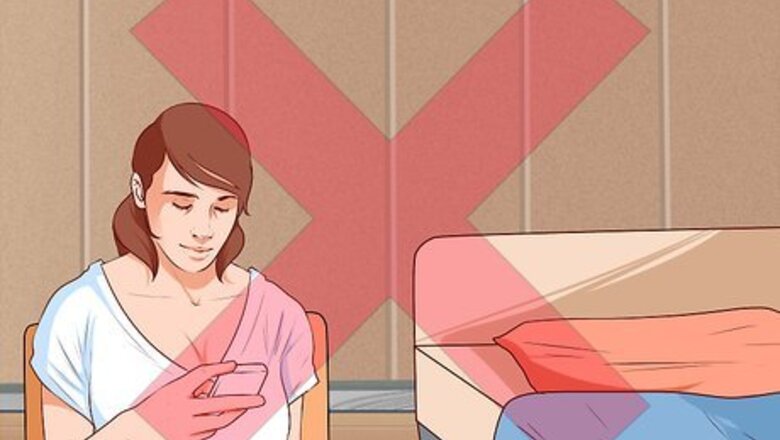
views
Going to Bed
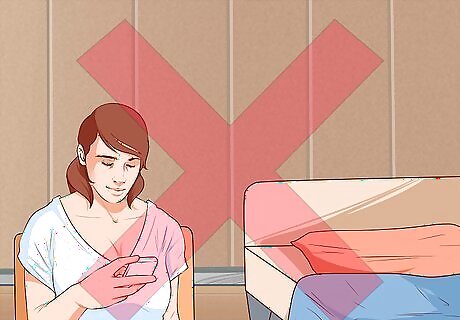
Unplug from your electronic devices at least an hour before bed. Stop using your computer, television, tablet, and smartphone to get to sleep more quickly. All of these gadgets emit blue light, which can prevent you from sleeping for a time after being exposed to it. To make matters worse, these screens are brightly backlit, beaming light directly into your eyes. Wind down the day by powering down your devices. Set the notifications on your phone to stop at night to keep from being distracted or tempted to look at its screen. If you can't tear yourself away from your devices, try reducing their damage instead. Use an app that filters out blue light before bed. Some phones and tablets now come with these settings already programmed in. Certain e-readers without LCD screens or backlights do not emit blue light or shine directly into the eyes. These are comparable to reading a conventional book and may be used before bedtime.
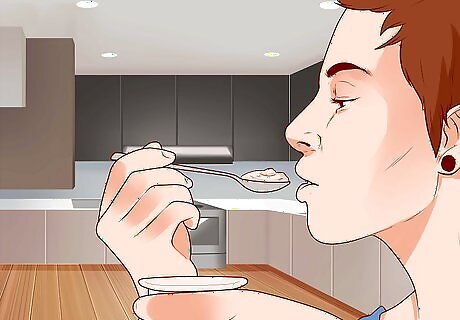
Have a snack if you're hungry. Hunger can make it difficult to get to sleep. If notice that you feel a little hungry while getting ready for bed, make sure to have a small snack. It's also a good idea to have some water if you're prone to waking up dehydrated. Some foods that can help you get to sleep more quickly are bananas, turkey, yogurt, peanut butter, dairy products, and whole-grain crackers. Many people relax with a caffeine-free, nonalcoholic beverage like herbal tea or warm milk while getting ready for bed. Don't eat a large meal before bed. Make sure your snack isn't fatty or spicy.
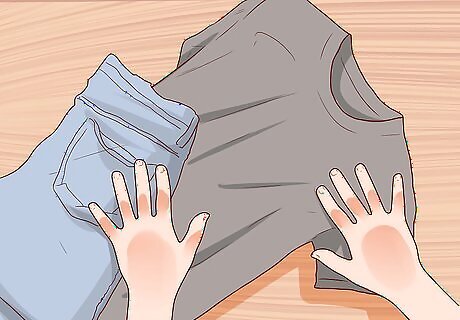
Get things ready for the next day. You'll also save time in the morning by taking care of a few things while you wind down. Some examples of things you can do are: Laying out your outfit. Setting up your coffee maker. Packing your lunch.
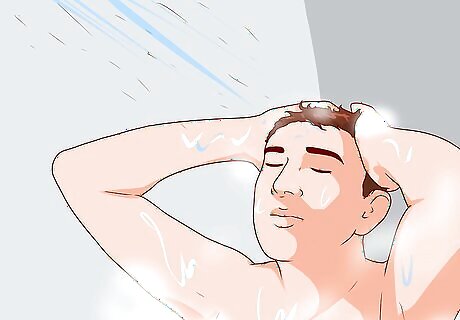
Take a shower if you wash at night. You can take care of most of the rest of your routine in a towel while you dry off. A warm shower can help you relax before bed. Most people don't need to wash their hair every day. Shave time off your bedtime routine by shampooing a few times a week or less. If you have fine, oily hair, though, you should probably keep up your daily washes. Contrary to popular belief, it can be ok to go to bed with damp hair. However, you will need to pull your hair back and style it to pull this off. If you wear makeup, make sure to take it off before you go to bed. Leaving makeup on can clog your pores and give you acne.
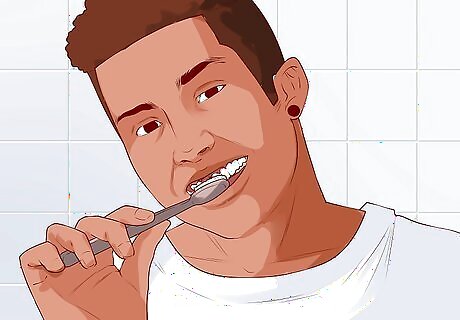
Brush your teeth. You should brush your teeth before you go to bed but only after you've finished eating and drinking. This will prevent bad breath in the morning and help protect you from cavities. It should take two minutes for you to brush your teeth. It may be helpful for you to set a timer. Some electric toothbrushes even come with two-minute timers already built into their handles. Use a soft-bristled brush to keep from wearing down your tooth enamel. Stick to fluoride toothpaste for maximum protection. Don't forget to brush your tongue, too. Quickly use the toilet if you need to. Afterwards, it's finally time to head to your bedroom.
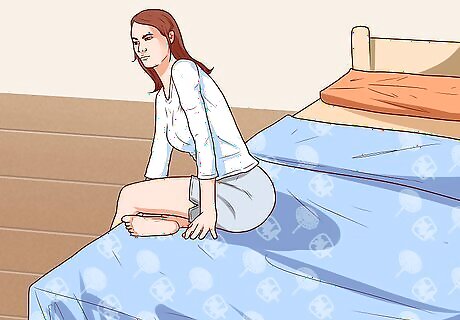
Climb into bed. Remember to make your target bedtime as closely as possible. Lying in bed awake from turning in too early can be just as bad for your sleep as going to bed late. If you find yourself regularly taking a half hour or more to fall asleep, consider moving your regular bedtime a little earlier. If you have trouble sleeping, you may keep a record of your sleeping habits called a sleep diary. Write down what time you actually get to bed. Keep your sleep diary on your nightstand in case you take a long time to fall asleep or wake up during the night.
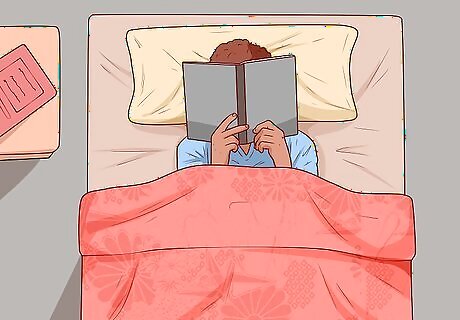
Read until you feel sleepy. Unless you're the type of person who falls asleep right away, you may need to do something to occupy your mind as you drift off. Since you shouldn't look at LCD screens before bed, a book is the best low-stimulus form of relaxing entertainment available. One you feel yourself starting to get tired, shut off your light or e-reader and close your eyes. Avoid reading anything too exciting. If you get lost in a good story, you may not want to get to sleep. Dry technical writing will probably help you to fall asleep more quickly than an engrossing adventure novel.
Timing it Right
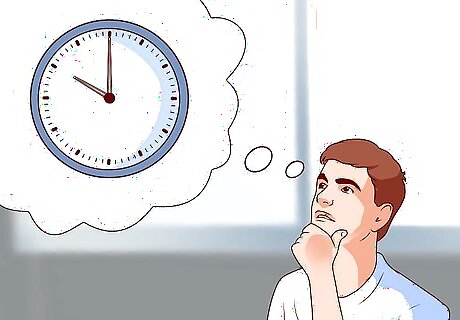
Decide on a bedtime and stick to it. For quality sleep, it's important to establish a regular bedtime routine. A major part of this is getting ready for bed at the same time each night. You'll use the bedtime you pick for most of your routine, counting backwards to figure out when to start getting ready for bed. If there is a set time you need to be out of bed by, count backwards from that to pick your bedtime. While many people think everyone should get eight hours a night, the actual amount varies from person to person. Figure out how much sleep you need to feel your best and set your bedtime with that in mind.
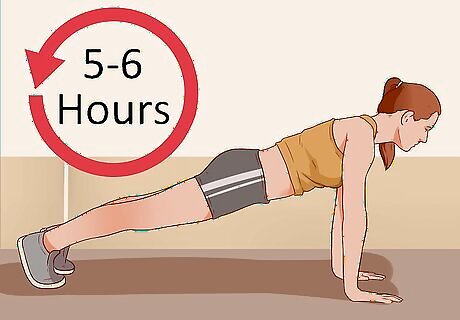
Exercise five to six hours before bed. Getting 20 to 30 minutes of exercise every day will help you get to sleep faster. However, exercising too close to your bedtime can overstimulate your mind and body, making it more difficult to fall asleep. Plan your activities five to six hours before you want to get to sleep for optimal results.
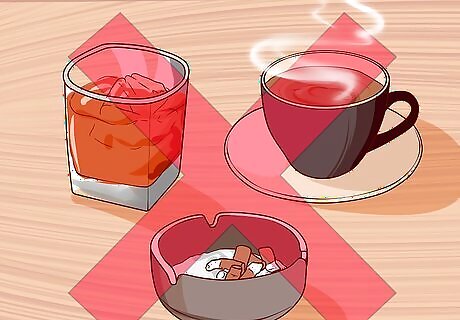
Avoid caffeine, nicotine, and alcohol before bed. All three of these substances can negatively affect your sleep quality. Stop all caffeine consumption four to six hours before your bedtime. To keep you from being wired all night, avoid coffee, tea, chocolate, caffeinated sodas, and certain pain relievers. Remember that decaffeinated coffee and tea still have some caffeine. If you drink tea to relax before bed, make sure it's an herbal one that is completely caffeine-free. Many people don't realize it because they may use tobacco products to relax, but the nicotine in them is actually a stimulant like caffeine. Additionally, withdrawal symptoms will make you wake up more frequently, ruining your sleep. While quitting tobacco products altogether will get you the best sleep, if you must smoke make sure your last cigarette for the night is at least two hours before bed. While alcohol may help you fall asleep faster, it also makes you wake up more frequently throughout the night. Have your last drink at least an hour before bed to allow your body time to process the alcohol.
Getting to Sleep Quickly
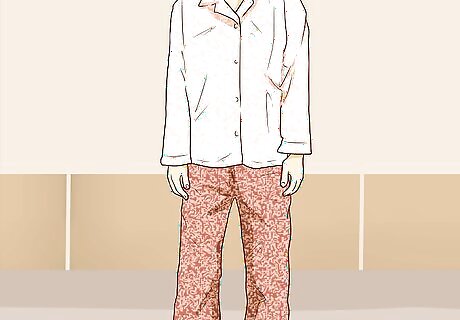
Make yourself as comfortable as possible. The last steps you take before getting to sleep are getting your mind to a relaxed enough state to wind down for the night. If you aren't comfortable in bed, you're more likely to take a long time to fall asleep. Depending on what you like to wear, your pajamas can be loose or tight, soft or stiff. The only thing that matters is that your pajamas are the most comfortable thing in your wardrobe. Make sure your bedroom is cool without being too cold. Shop around for the right pillows, mattress, and bedding that fits your tastes. If some aspect isn't quite right, try a different item if you can. Don't overlook your auditory comfort. If you're sensitive to noise, even minor disturbances can keep you up all night. Run a fan or white noise machine to mask intrusive sounds.
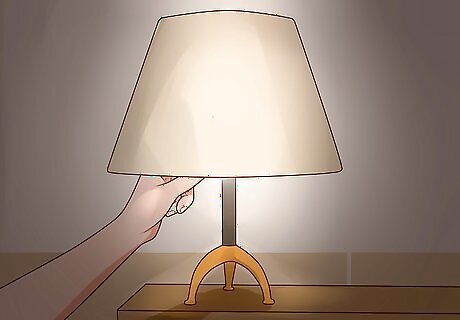
Make sure your bedroom is completely dark. The most important aspect of the bedroom for most people is to shut out as much light as possible. Light can trick us into thinking it's daytime, stalling our sleep cycle. The exception to this rule is a small light for reading that you can easily turn off while lying down. You can use either a lamp with a low-watt bulb on your nightstand or a small book light. If there is a light outside your bedroom window that is too bright, consider installing blackout curtains. The same strategy can be used if you work nights and are forced to sleep while the sun is still up.
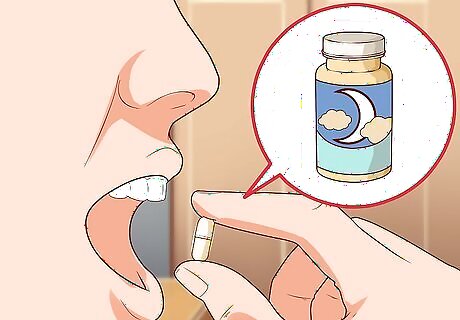
Take any sleep medications at the appropriate time. If your doctor has directed you to take a nightly sleep aid, it's important to take your medication at the right time each night. There are a wide variety of sleep medicines on the market, each with their own optimal dosing time. Some people react differently to medications and may need to take a sleep aid at a non-standard time. Fast-acting medications, which includes most prescription sleep aids, should generally be taken right before you climb into bed. Depending on your reason for taking melatonin, you may be advised to take it anywhere from one to five hours before bed.

















Comments
0 comment